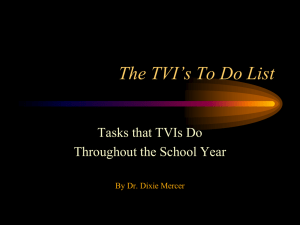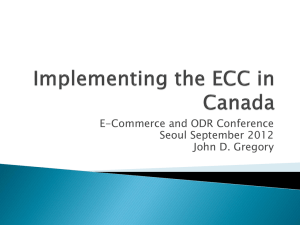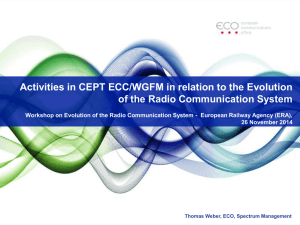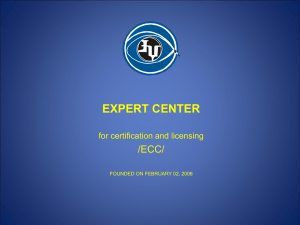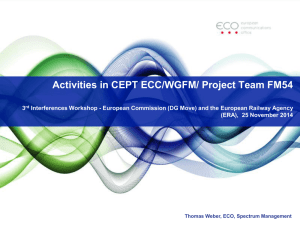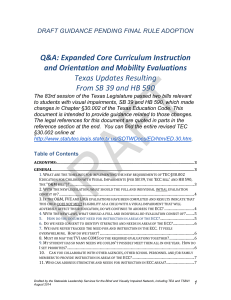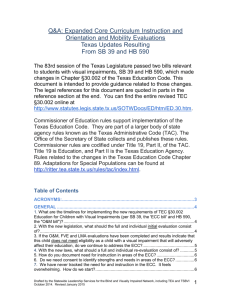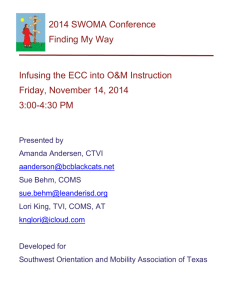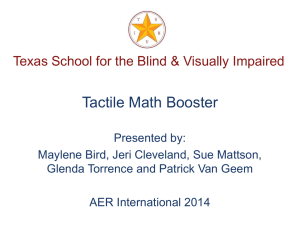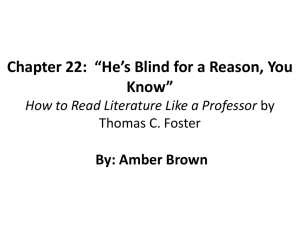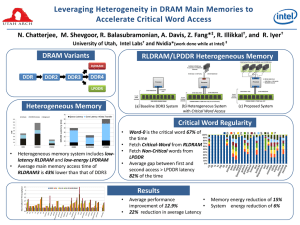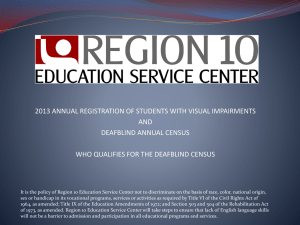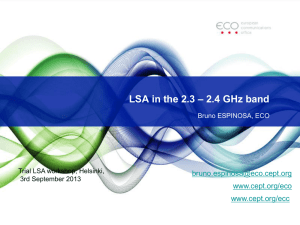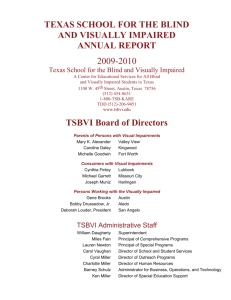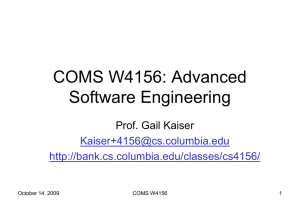Addressing ECC - Region 10 Education Service Center
advertisement
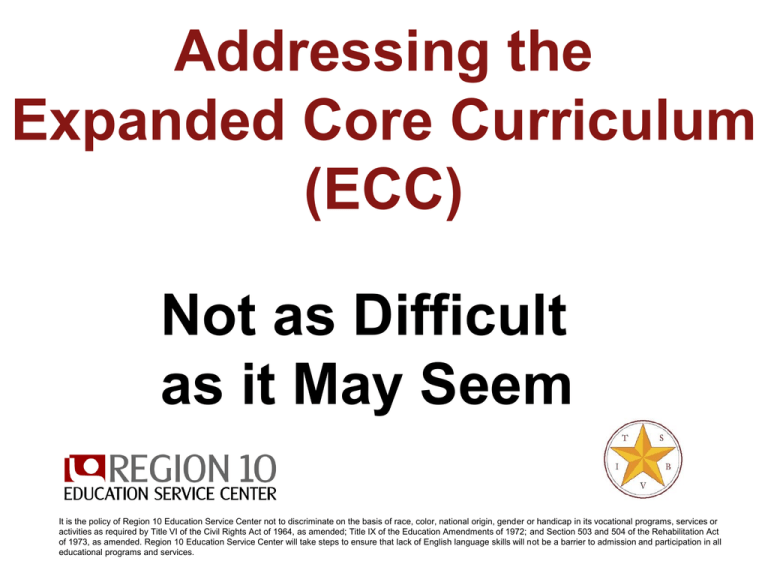
Addressing the Expanded Core Curriculum (ECC) Not as Difficult as it May Seem It is the policy of Region 10 Education Service Center not to discriminate on the basis of race, color, national origin, gender or handicap in its vocational programs, services or activities as required by Title VI of the Civil Rights Act of 1964, as amended; Title IX of the Education Amendments of 1972; and Section 503 and 504 of the Rehabilitation Act of 1973, as amended. Region 10 Education Service Center will take steps to ensure that lack of English language skills will not be a barrier to admission and participation in all educational programs and services. Objectives • • • • • Law Role of TVI and COMS Role of administrator ECC evaluation and IEPs Where to find more information ECC Areas 1. Assistive technology skills, including optical devices 2. Compensatory skills that permit access to the general curriculum 3. Career education and planning 4. Recreation and leisure skills 5. Orientation and mobility skills (O&M) 6. Social interaction skills 7. Sensory efficiency (including visual, tactual and auditory skills) 8. Self-determination 9. Independent living skills National Agenda “In addition to all the core curricular areas included in the general educational curriculum, students with a visual impairment need to be assessed and receive instruction in very specific skills that have been demonstrated to be potential problem areas for persons with a visual disability.” http://www.tsbvi.edu/agenda/wi-ecc.htm Law SB 39 http://www.capitol.state.tx.us/BillLookup/BillSummary.aspx?LegSess=83R&Bill=SB39 • Amends Section 30.002, Education Code • Summary: The bill adds language that would require the evaluation of and subsequent instruction in Braille, concept development, Orientation and Mobility, social interaction skills, career planning, assistive technology, including optical devices, independent living skills, recreation and leisure enjoyment, self-determination, and sensory efficiency for students who are blind or visually impaired. These instructional areas are commonly referred to as the Expanded Core Curriculum. Law SB 39, cont. • Change from current law: Updates agency references and terminology related to the ECC, and codifies the requirement to provide evaluation and instruction in the elements of the ECC to students who are blind or visually impaired. • Effective Date: June 14, 2013 • Action required for 2013-14 School Year: Districts must evaluate a student’s proficiency in the elements of the ECC and provide instruction as required by the evaluation. New Law- HB 590 http://alliancevitexans.org/category/announcements/ • Change: Adds Subsections 30.002 (c-1) and (c-2), • Summary: This bill requires an orientation and mobility evaluation. • Education Code: (O&M) evaluation performed by a certified orientation and mobility specialist (COMS) as part of special education eligibility considerations for children with a suspected or diagnosed visual impairment. Subsection (c-2) requires that a COMS be part of the multidisciplinary team that performs reevaluations for purposes of continuing eligibility for special education for students with a vision impairment. New Law- HB 590, cont. • Change from current law: Adds O&M evaluation to currently require ophthalmological or optometric evaluation, functional vision, and learning media assessments currently required for special education eligibility for students with visual impairments. • Effective Date: June 14, 2013. • Action required for 2013-14 School Year: Commissioner’s rules need to be adopted by January 1, 2014 to implement the new subsections by the beginning of the 2014-2015 school year. Role of TVI and COMS • HOW CAN THEY FIT IT ALL IN? Facilitator Leader of the Band Role of TVI and/or O&M • • • • • Evaluation Direct Instruction Consultation Collaboration Facilitation with community and statewide resources Evaluation • • • • In the FVE/LMA? Part of permanent records? What ages? What tools? – Academic blind and low vision – Infants – Multiply impaired visually impaired • Annually? Options: BE CREATIVE! Option 1: Direct Instruction Who: TVI and/or COMS When: During direct instruction Option 2: Consultation Who: Other related service When: During instructional time with vision consultation Option 3: Collaboration Who: TVI and/or COMS facilitate skills with other school personnel/parents/community agencies When: During other classes or after school Option 3: Ideas Access general ed & special ed classes • • • • Home economics class Consumer math class Keyboarding class Work programs Community programs • Boy or Girl Scouts • Outside agencies (DBS) Be creative • Develop local credit class • Extra curricular activities • Community college credit and non-credit classes • Adult mentoring Option 4: Facilitation with community and statewide resources • Long term (residential) placement at TSBVI • Short term programs/summer school/weekend programs at TSBVI • Iron Chef, Culinary Arts, Looking Good • Accessible Math Tools & Strategies • Low Vision Tools & Strategies • Writers’ Workshop, Astronomy & Getting There • Rock Band, Art from the Heart, & Web Masters Facilitation with community and statewide resources, cont. • • • • • • Division of Blind Services Independent living centers Lighthouse for the Blind Lions camp Regional service center activities Other summer camps and programs Administrator Role • Evidence of ECC assessments in evaluation reports • Evidence of IEP goals based on evaluations • Evidence of ECC instruction during staff observations Ways to support staff • Support training for VI/O&M staff on addressing ECC needs through conferences, regional service centers, TSBVI Outreach • Provide resources for ongoing data collection to VI/O&M staff to complete ECC checklists/evaluations as part of FVE/LMA and O&M evaluations Ways to support staff, cont. • Provide strong support and time for collaborative team discussions on multidisciplinary approach to addressing student ECC needs. • Remember options for addressing the ECC Ways to support staff, cont. • Provide solutions for addressing ECC goals • Consider time outside of the regular school day • Exchange/comp time • Before and after school • Summer instruction • Transportation • Community exploration and experiences Resources for ECC • 2014 Guidelines and Standards for Educating Students with Visual Impairments in Texas http://www.tsbvi.edu/attachments/EducatingSt udentswithVIGuidelinesStandards.pdf • The National Agenda for the Education of Children and Youths with Visual Impairments, Including Those with Multiple Disabilities, Revised http://www.tea.state.tx.us/index2.aspx?id=214 7498410 Resources for ECC, cont. • American Foundation for the Blind http://www.eccadvocacy.org/section.aspx?F olderID=13 and www.afb.org • Region 10 ESC website, link for ECC http://www.region10.org/supplementaryservices/programs/expanded-corecurriculum-ecc/ • Alliance of and for Visually Impaired Texans (AVIT) http://alliancevitexans.org/ Resources for ECC, cont. • TSBVI RECC (Resources for the Expanded Core Curriculum) http://www.tsbvi.edu/recc/ • EVALS Kit: Evaluating Visually Impaired Students http://www.tsbvi.edu/curriculum-apublications/3/1030-evals-evaluating-visuallyimpaired-students • TSBVI Curriculum and Publications http://www.tsbvi.edu/curriculum-apublications Things to Remember • • • • • How much can I do this first year? Team decision!!! No “one size fits all” Don’t forget infants Parent and student input is critical Contact Us Christy Householter Christy.householter@region10.org 972-348-1634 http://www.region10.org/SSVI/index.html Contact Us Texas School for the Blind & Visually Impaired Outreach Programs www.tsbvi.edu/Outreach Ann Adkins Adkinsa@tsbvi.edu Debra Sewell sewelld@tsbvi.edu
